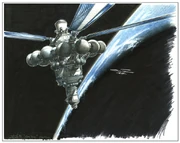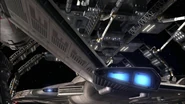The Orbital Drydock Facility was a spacedock where the first warp five starship, Enterprise NX-01, was constructed.
The spacedock was made up of five cage segments, with one long section providing the dorsal part of the cage and two smaller sections on either side providing the port and starboard parts. These sections housed banks of lights facing inwards, towards where the ship would be located. The dorsal sections also supported a small windowed station in the center of the facility as well as rails that four movable construction arms were attached to. Housed in the center joint of the smaller sections making up the walls of the cage were small stations. Each station had a total of four airlocks at the bow and stern, one facing outwards along the centerline where other segments could be added as well as one airlock each facing port, starboard, and ventral. An airlock was also located on the centerline facing "outwards" from each station. One of the segments on the port side also had a large antennae farm located just below the station. (ENT: "Broken Bow", "The Expanse", "Borderland")
Enterprise was launched from this facility early on a mission to the Klingon homeworld in 2151. (ENT: "Broken Bow")
In 2153, Enterprise was retrofited in this spacedock to upgrade her for the mission to find the Xindi and stop a second weapon from being launched against Earth. (ENT: "The Expanse")
In May 2154, Enterprise departed from this spacedock shortly before investigating the Augment Crisis. (ENT: "Borderland")
Appendices
Background information
This docking facility may be part of the Warp Five Complex, but this was never confirmed. The facility was referred to as a "Spacedock" in the episode's script. [1] In a blueprint of the Enterprise's bridge that was auctioned off in the It's A Wrap! sale and auction (item #4654), the spacedock is referred to as Orbital Drydock Facility 314, Station 15 B. [2] Orbital 6 also had markings on the side reading Orbital Drydock Facility and Shipyard Ops.

The first concept sketch that John Eaves created for the spacedock
While the look of the spacedock was not yet decided, about four conceptual passes at designing the dock were tried out. The first of these, dated February 2001, was decidedly contemporary while also heavily influenced by the chronological setting of Star Trek: Enterprise. Senior illustrator John Eaves, who was involved in designing the dock, later explained, "We were designing a new segment in time just a few decades prior to the original series. The idea was to retro back everything from the 60′s iconic series to a more NASA and nuts and bolts kind of look. With that in mind we ventured into a new yet older style of spacedock/drydock design with a skylab feel to the aesthetics. The result of this path [was] [...] a large circular space station with massive solar arrays and domed details to bring us all back into a more present time of space architecture with a slightly futuristic feel [....] [We finally settled] on a more chunky version of the traditional dry dock as established in The Motion Picture." [3]
Pierre Drolet, a visual effects artist at Foundation Imaging, was largely responsible for deciding how the spacedock turned out. "He just said, 'Let me see what I can come up with,' and ultimately [the producers] went for it," remembered Foundation's Robert Bonchune. "Pierre built something that was sort of a step backward from The Motion Picture drydock. A little beefier, a little more like the dry dock from Generations." (Star Trek Monthly issue 86, p. 23) The dock included some other minor details that helped differ it from previous docks, such as the one in The Motion Picture. "It is still a drydock shape; it's just clunkier and a little more primitive," said Bonchune. "We put in little things like grappler hooks at the bottom to move things around. There are little details like gold foil and thermal blankets on some things." (Star Trek: The Magazine Volume 2, Issue 10, p. 26)
For "Broken Bow", executive producers and series creators Rick Berman and Brannon Braga originally wanted a vast stadium to be witness to Enterprise's departure from the dock, though these scenes were thereafter moved to being set on an observation deck of the spacedock itself. "We always imagined a stadium full of people, but you never quite end up with as much as you want," acknowledged Braga. ("Broken Bow" audio commentary, ENT Season 1 DVD)
The spacedock's observation deck was actually a redress of the Enterprise armory set. ("Broken Bow" text commentary, ENT Season 1 DVD) The interior scenes set in this room were filmed on 5 June 2001, on Paramount Stage 18. (Broken Bow call sheet)
Subsequently, the spacedock's observation deck was optically enlarged; visual effects added a secondary balcony to the room as well as more audience members than the number of extras who had been on the set. ("Broken Bow" text and audio commentaries, ENT Season 1 DVD) "When we saw the dailies, Rick Berman decided that the event should be bigger and have more people, so I figured out a way I could hand-paint set extensions," recalled visual effects producer Dan Curry. "By reducing and tweaking perspective and shooting background people against greenscreen, we were able to build layers of audience and make the room bigger than the original set had been." Curry was ultimately very proud of the launch sequence, which Robert Bonchune also worked on. (Star Trek: The Magazine Volume 2, Issue 10, pp. 26-27)
However, Doug Drexler was not entirely satisfied with the final exterior design of this facility, commenting, "The fiver seemed as big and complex (perhaps even more so) than the drydock from TMP." Drexler also admitted to having "never understood" the large antennae farm included as part of the five-fingered facility. [4]
A CGI render of this spacedock can be found in the ENT Season 1 DVD, as part of a computer-animated sequence that introduces the main menu for each disc.
Apocrypha
In the novelization of "Broken Bow", the primary Enterprise spacedock is referred to as consisting of geodesic parts that were assembled on Earth before being constructed in space, expanding the dock to its full size therein.



